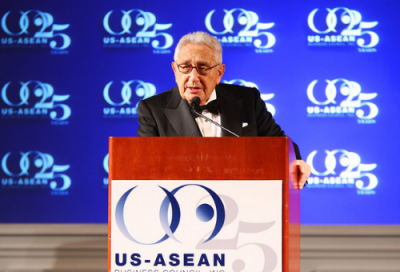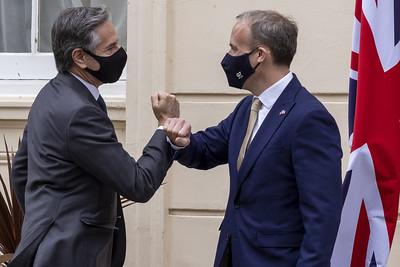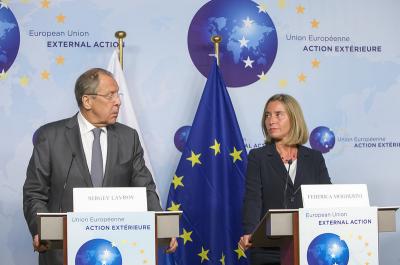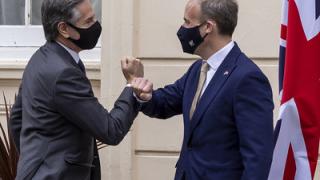What The Hell Is The Rules-Based Order? Kissinger Makes Sense, While Biden Team Continues Its Provocations
By Harley SchlangerBy Harley Schlanger
May 10, 2021 -- For many years, Lyndon LaRouche identified Henry Kissinger as an example of what's wrong with American foreign policy. While Kissinger's ego caused him to treat his version of "realpolitik" as novel and creative, LaRouche insisted that he was, at his core, one who always operated within the realm of classical British imperial geopolitics, against the true national interests of the U.S. -- functioning as a de facto agent of the British Empire.

New Federalist newspaper from 1992.
One prime example of this allegiance was his role in promoting population reduction as a strategic aim of the U.S., through his sponsorship of National Security Study Memo 200. Titled "Implications of Worldwide Population Growth for U.S. Security and Overseas Interests" , the memo was prepared by the National Security Council under Kissinger's direction, and was a blueprint for U.S. intervention on behalf of radical population reduction in developing sector countries. The underlying theme was that of the classical British Malthusian doctrine, of "too many people fighting over scarce resources", and was coherent with the open advocacy of British elites -- beginning with Prince Philip -- to use "environmental concerns" to impose drastic population reduction on poorer nations. Completed in December 1974, it became official policy when signed by President Ford in November 1975. Due to its controversial nature, it was classified for several years. When it was declassified, it offered compelling evidence that LaRouche had been right, when he characterized Kissinger as an agent operating on behalf of the Empire.

Gerald Ford and Kissinger in Jakarta meeting president Suharto on December 6, 1975, one day before the Indonesian invasion of East Timor, which lead to the death of hundreds of thousands.
Kissinger himself acknowledged this in a speech given at Chatham House on May 10, 1982, when he said, "The British were so matter-of-factly helpful that they became a participant in internal American deliberations, to a degree probably never before practiced between sovereign nations. In my period in office, the British played a seminal part in certain American bilateral negotiations with the Soviet Union--indeed, they helped draft the key document. In my White House incarnation then [as national security adviser], I kept the British Foreign Office better informed and more closely engaged than I did the American State Department."
It might therefore be most surprising to his one-time colleagues at Chatham House to hear Kissinger warn, in a speech delivered April 30, that the present Trans-Atlantic policy toward Russia and China -- much of which is scripted by MI6 operatives who operate out of Chatham House, and their City of London confreres -- could lead to a catastrophic war.

Henry Kissinger, at the USABC 25th Anniversary. Photo CC/Jackmyint
Identifying China today as a more formidable military force than the Soviets were during the Cold War, he said:
“A conflict today with such a high-tech power would be of such colossal input and significance…. It’s the biggest problem for America; it’s the biggest problem for the world. Because if we can’t solve that, then the risk is that all over the world, a kind of Cold War will develop between China and the United States.”
Given such a threat, he said that while the U.S. must remain “true to its principles,” there must be “continual negotiations with China,” as well as with Russia. It was a mistake, he said, “that we haven’t had serious negotiations with Russia for over a decade.” Diplomacy cannot always resolve the problems, he said, but if it fails, “we have to be sure that we have tried all options.”
Blinken Embraces The "Special Relationship"
In contrast to Kissinger's relatively sensible conclusion, Biden operatives, Secretary of State Blinken and National Security Adviser Sullivan took to the Sunday blab shows on May 2 like bulls in the proverbial china shop. On "Sixty Minutes", Blinken repeated the standard lies about alleged concentration camps in China's Xinjiang province, and its "malign" and "aggressive" approach against its neighbors. He insisted the U.S. must defend the "Rules-Based-Order" (RBO) which China opposes, referring to the unipolar world shaped around Anglo-American interests, saying that we will "stand up and defend it" against China.
As for Russia, while dropping hints that discussion is underway to confirm a Biden-Putin summit, Blinken's State Department issued a memo, which fully endorsed the charges from the MI6 leak sheet, Bellingcat, that Russian GRU operatives were responsible for the explosion at a Czech ammunition depot in 2014! The memo described the explosions as "subversive and deadly actions on Czech soil", and announced that the U.S. is planning to impose new sanctions in response. British Foreign Secretary Raab said the incident exposes the lengths Russia will go "to conduct dangerous and malign operations in Europe." As is so often the case in the "blame Russia" game, no evidence has been presented to back up these charges. Blinken stopped in London on May 3 to coordinate with his British counterparts a strategy for dealing with Russia and China, in preparation for the upcoming G7 summit hosted by Boris Johnson.
The G7 Foreign Ministers meeting turned into a lengthy session to insure that members of the G7 were properly lined up with the U.S. and the U.K. against Russia and China. There were two ninety-minute sessions during which the sole topic was coordination against Russia and China. Included in these sessions were presentations of the latest fabricated evidence against Russia on Navalny, allegations of cyber-warfare, and the forecast of a coming escalation of warfare against Ukraine, as well as a review of NATO's ongoing maneuvers, Europe Defender-21, the largest exercises in many years. While warning Russia against carrying out military exercises inside Russia, along the border with Ukraine, NATO's maneuvers include deployment of U.S. troops in the Baltic states, Hungary, Poland and Rumania, close to the borders of Russia. There was also discussion of providing more weapons to Ukraine, to "defend" them from Russian encroachment and bullying, and the possibility of providing NATO membership to Ukraine.

Left: US tanks arrive for NATO exercise Defender 20, US led exercises bringing 20.000+ troops to the border of Russia. Right: NATO Military Committee Chairman visits Ukraine, April 2021
Photo: NATO
In London, Blinken had a separate meeting with his British counterpart, Dominic Raab, in which his Anglophilia was on display. He opened a joint press conference by praising Winston Churchill's speech in Fulton, Missouri given 75 years go, in which he roped the hapless President Harry Truman into the Cold War alliance with the U.K. with his "Iron Curtain" speech. Instead of denouncing this as blatant British interference in U.S. affairs, Blinken endorsed it as the "foundation" for the present-day "Special Relationship."

Blinken with UK Foreign Secretary Dominic Raab, London May 3, 2021
This relationship, he declared, is focused today on addressing the "threats to the international Rules-Based Order, and to democratic values and human rights." The Special Relationship "is enduring," he proclaimed. "It's effective. It's dynamic. And it is close to the hearts of the American people....The United States has no closer ally, no closer partner than the United Kingdom, and I am very glad for the chance to say that again here today."
In his response, Raab spoke of Boris Johnson's desire to bring others into the G7, including South Korea, Australia, South Africa and Japan, all of which were present at the Foreign Ministers meeting. This is an "alliance of democracies", he stated, promoted by both Johnson and Biden, to "counterbalance the autocracies of China and Russia." He described this possible expansion of the G7 as an "agile cluster of like-minded countries," which "want to protect the multilateral system."
This formulation is particularly false, as the "Rules-Based Order" they claim to be protecting is in reality a unipolar world, in which military muscle and illegal sanctions regimes are used to defend the interests of the City of London and Wall Street, over and above the sovereign interests of the nations of the world -- which is hardly a "multilateral system." In promoting the concept of the RBO as the fundamental goal of policy, they are undermining the principles of international law, which have been adopted by the United Nations and affirmed by numerous international agreements and conferences.
For his part, National Security Adviser Sullivan on ABC News "This Week" likewise defended the "rules-based order", when it comes to climate policy. China must adhere to the accepted climate rules (defined by the unipolar order), saying "it is in the best interest of the U.S. for us to be the clean energy superpower of the world, not China or anyone else (emphasis added)."
Commenting on this coordination at the G7 level in the context of pressure on Europe to maintain the multitude of sanctions on Russia, Russian Foreign Minister Lavrov told an interviewer on April 28, "I still believe that the UK is playing an active and a very serious subversive role...they are trying to influence EU member states' approaches to Russia...."

Then VP of the EU commission Federica Mogherini with Sergey Lavrov, Russian Minister of Foreign Affairs. July 2017. Photo credit:EEAS






